
La cambiale di matrimonio is a one-act operatic farsa comica by Gioachino Rossini to a libretto by Gaetano Rossi. The libretto was based on the play by Camillo Federici (1791) and a previous libretto by Giuseppe Checcherini for Carlo Coccia's 1807 opera, Il matrimonio per lettera di cambio. The opera debuted on 3 November 1810 at the Teatro San Moisè in Venice. It had a run of thirteen performances at Teatro San Moisè.
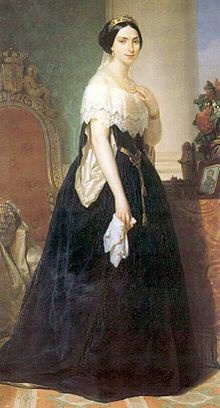
Adelaide Tosi was an Italian operatic soprano.
Giovanni Tadolini was an Italian composer, conductor and singing instructor, who enjoyed a career that alternated between Bologna and Paris. Tadolini is probably best known for completing six sections of Rossini's 1833 version of the Stabat mater after the latter fell sick. However, he also composed eight operas as well as sinfonias, sonatas, chamber music, and numerous pieces of religious music and art songs.

Raffaele Ferlotti was an Italian operatic baritone who had an active international career from the 1830s through the 1860s. He was a regular performer in Italy's leading opera houses, especially La Scala, and created roles in several world premieres. On the international stage he performed in operas in Austria, England, France, and Spain.
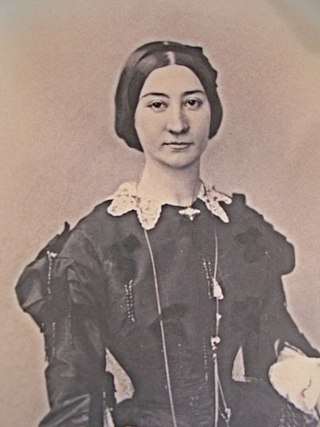
Angiolina Bosio was an Italian operatic soprano who had a major international career from 1846 until her premature death in 1859 at the age of 29. She sang at the most important opera houses in Boston, Havana, London, Madrid, Moscow, New York, Paris, Philadelphia, Saint Petersburg, and Verona. She was particularly admired for her performances in operas by Giuseppe Verdi.

Antonio Poggi was an Italian operatic tenor who had an active international career from 1827–1848. He is best remembered for creating roles in the world premieres of operas by Gaetano Donizetti and Giuseppe Verdi. He was married to soprano Erminia Frezzolini from 1841–1846.

Salvator Rosa is an opera seria in four acts composed by Antônio Carlos Gomes to a libretto in Italian by Antonio Ghislanzoni. It premiered at the Teatro Carlo Felice in Genoa on 21 March 1874. The plot is based on Eugène de Mirecourt's 1851 adventure novel, Masaniello, in turn loosely based on the lives of the Italian painter and poet, Salvator Rosa and Masaniello, a Neapolitan fisherman, who became leader of the 1647 revolt against the Spanish Habsburg rule in Naples.
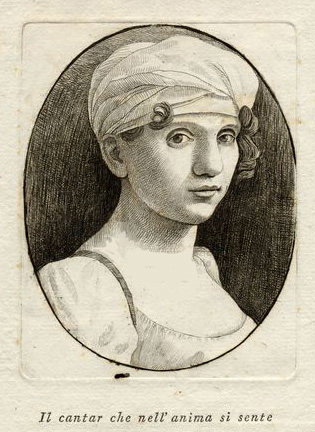
Elisabetta Manfredini-Guarmani was an Italian opera singer best known for having created the leading soprano roles in four of Rossini's operas, roles which he wrote specifically for her voice. She was born Antonia Elisabetta Manfredini in Bologna and was the daughter of the composer and music theorist Vincenzo Manfredini. After her stage debut in 1810 when she sang in the premiere of Stefano Pavesi's Il trionfo di Gedeone at Bologna's Teatro del Corso, she went on to perform at La Fenice, La Scala, Teatro Regio di Torino, Rome's Teatro Argentina and several other opera houses, primarily in Northern Italy. In addition to the roles she created in Rossini's operas, she also sang in the world premieres of operas by several composers who are lesser known today, including Pietro Raimondi, Simon Mayr, and Ferdinando Paër. Her last known appearance was in 1828 after which there is no further trace of her. The date and place of her death are unknown.

Vincenzo Negrini was an Italian bass-baritone opera singer. Born in Cesena, he sang leading bass and baritone roles in Italy's major opera houses and created several roles in early 19th-century operas, most notably Oroveso in Bellini's Norma and Folco in Donizetti's Ugo, conte di Parigi. Severe heart disease caused him to retire from the stage in June 1840. He died in Milan two months later at the age of 35.
Paolo (Pablo) Rosich was a Spanish-born opera singer and librettist widely known by the Italianized version of his first name. A skilled comic actor, he performed leading basso buffo roles in many Italian opera houses as well as in Lisbon, London, Madrid and New York. Rosich created the roles of Taddeo in Gioachino Rossini's L'italiana in Algeri and Buralicchio in Rossini's L'equivoco stravagante and also wrote the librettos for two operas by Manuel García: L'amante astuto and La figlia dell' aria.

Serafino Gentili was an Italian opera singer particularly known for his performances in tenore di grazia roles. He sang in opera houses throughout Italy as well as in Paris and Dresden. During the course of his career, he created the role of Lindoro in Rossini's L'italiana in Algeri as well as leading roles in several other operas by less well-known composers. In his later years, he went by the surname Gentili-Donati to distinguish himself from the tenor Pietro Gentili.
Vincenzo Galli was an Italian opera singer and impresario. Considered an outstanding basso buffo singer, he created many roles on Italian stages, including in two of Donizetti's operas: Ivano in Otto mesi in due ore and Cesare Salzapariglia in Le convenienze ed inconvenienze teatrali. Luigi Ricci composed the role of Michelotto in his opera Chiara di Rosembergh specifically for Galli's voice.
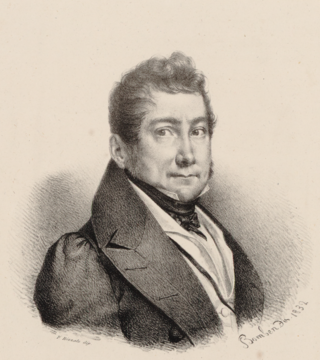
Caterina di Guisa is an opera in two acts by Carlo Coccia to a libretto by Felice Romani based on the 1829 play Henry III and His Courts by Alexandre Dumas. Caterina di Guisa premiered on 14 February 1833 at the Teatro alla Scala in Milan with triumphal success. A revised version, probably prepared to exploit at its best the different cast, was presented on 15 June 1836 at the Teatro Carignano in Turin. This opera is characterized by an "intensely dramatic score, rich in power and originality" and by a "heartrending finale".

Isabella Fabbrica was an Italian operatic contralto.

Maria Teresa Rebecca Brambilla better known as Marietta Brambilla was an Italian contralto who sang leading roles in the opera houses of Europe from 1827 until her retirement from the stage in 1848. She is best known today for having created the roles of Maffio Orsini in Donizetti's Lucrezia Borgia and Pierotto in his Linda di Chamounix, but she also created several other roles in lesser-known works. She was the elder sister of the opera singers Teresa and Giuseppina Brambilla and the aunt of Teresina Brambilla who was also an opera singer.
Calisto Bassi was an Italian opera librettist.

Fanny Eckerlin (1802–1842) was an Italian mezzo-soprano who also sang contralto roles. During her career she was highly regarded, drawing favorable comparisons to Benedetta Rosmunda Pisaroni, but today she is remembered, if at all, for her association with the early career of Gaetano Donizetti, including creating the title role in his first publicly-performed opera, Enrico di Borgogna.

Anna Mombelli, born Marianna Mombelli, was an Italian opera singer who sang both mezzo-soprano and contralto roles. She is primarily known for having created the role of Siveno in Rossini's first opera Demetrio e Polibio in 1812.
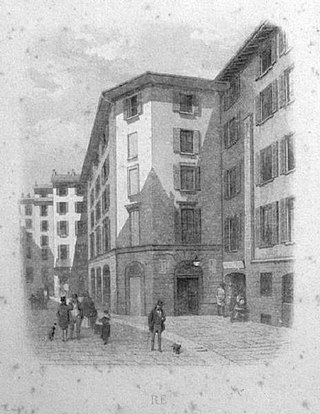
The Teatro Re was a theatre in Milan, located near the Piazza del Duomo and named for its proprietor, Carlo Re. It functioned as both a prose theatre and an opera house and saw the world premieres of numerous operas, including four by Giovanni Pacini. Designed by Luigi Canonica, the theatre was inaugurated in 1813, closed in 1872, and demolished in 1879.
Savino Monelli was an Italian tenor prominent in the opera houses of Italy from 1806 until 1830. Amongst the numerous roles he created in world premieres were Giannetto in Rossini's La gazza ladra, Enrico in Donizetti's L'ajo nell'imbarazzo and Nadir in Pacini's La schiava in Bagdad. He was born in Fermo where he initially studied music. After leaving the stage, he retired to Fermo and died there five years later at the age of 52.















